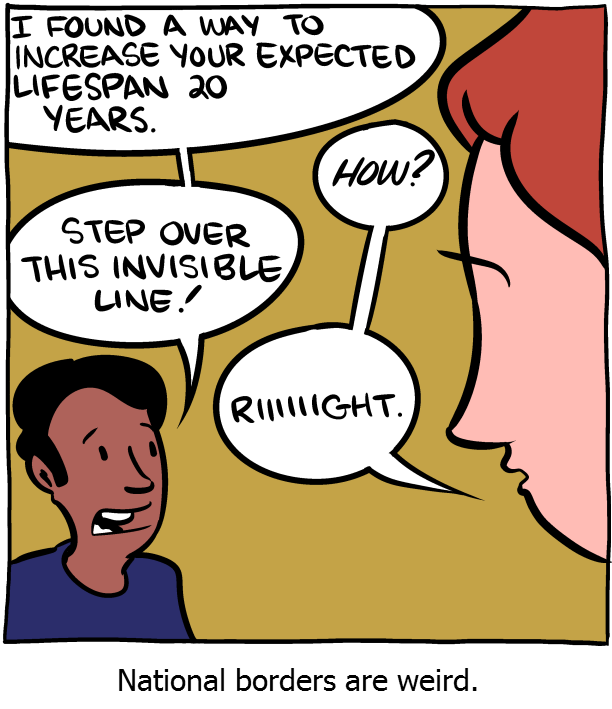Thinking about immigration in the context of the Phoenix Mennonite Convention next week, I wanted to offer my thoughts from a Christian perspective. In short, I agree with Open Borders. Morally, all Christians everywhere ought to support basically open borders between countries, such that anyone who wanted to live and work in a different place would be allowed to.
Why? Because open borders helps people around the world, most of whom are not me. Open immigration, from the American perspective, is a key example of loving one's neighbor as one's self, and the kind of self giving love that is core to the Christian vision.

If you live in a developing country, open borders mean:
a roughly 4x increase in income.
an opportunity to escape places of violence, corruption, and natural disaster.
significantly increased life expectancy.
A better life for your descendents for generations to come,
and the chance to experience freedom of choice and human liberty, by getting to live in the place of your choice.
If you live in this country as an undocumented immigrant, open borders mean
the chance to work publicly.
the safety to protest unjust working conditions.
Increased income.
Freedom from fear of deportation, and years of detainment without trial.
Allow you to become a full member of society, with both the obligations and benefits of legal status.
If you are already a United States citizen, open borders mean
a bigger economy
little impact on wages
a changing cultural makeup of the United States
increased global carbon emissions.
When we weigh costs and benefits, why would we not open borders to everyone in need?
http://www.cgdev.org/publication/place-premium-wage-differences-identical-workers-across-us-border-working-paper-148
http://www.theatlantic.com/international/archive/2013/04/if-people-could-immigrate-anywhere-would-poverty-be-eliminated/275332/
http://www.huffingtonpost.com/2013/06/14/immigration-economy_n_3437482.html
http://www.americanprogress.org/issues/immigration/report/2013/04/03/59040/the-facts-on-immigration-today-3/
http://qz.com/95665/the-us-immigration-bill-is-the-economic-reform-weve-all-been-waiting-for/
Why? Because open borders helps people around the world, most of whom are not me. Open immigration, from the American perspective, is a key example of loving one's neighbor as one's self, and the kind of self giving love that is core to the Christian vision.

If you live in a developing country, open borders mean:
a roughly 4x increase in income.
an opportunity to escape places of violence, corruption, and natural disaster.
significantly increased life expectancy.
A better life for your descendents for generations to come,
and the chance to experience freedom of choice and human liberty, by getting to live in the place of your choice.
If you live in this country as an undocumented immigrant, open borders mean
the chance to work publicly.
the safety to protest unjust working conditions.
Increased income.
Freedom from fear of deportation, and years of detainment without trial.
Allow you to become a full member of society, with both the obligations and benefits of legal status.
If you are already a United States citizen, open borders mean
a bigger economy
little impact on wages
a changing cultural makeup of the United States
increased global carbon emissions.
When we weigh costs and benefits, why would we not open borders to everyone in need?
http://www.cgdev.org/publication/place-premium-wage-differences-identical-workers-across-us-border-working-paper-148
http://www.theatlantic.com/international/archive/2013/04/if-people-could-immigrate-anywhere-would-poverty-be-eliminated/275332/
http://www.huffingtonpost.com/2013/06/14/immigration-economy_n_3437482.html
http://www.americanprogress.org/issues/immigration/report/2013/04/03/59040/the-facts-on-immigration-today-3/
http://qz.com/95665/the-us-immigration-bill-is-the-economic-reform-weve-all-been-waiting-for/

